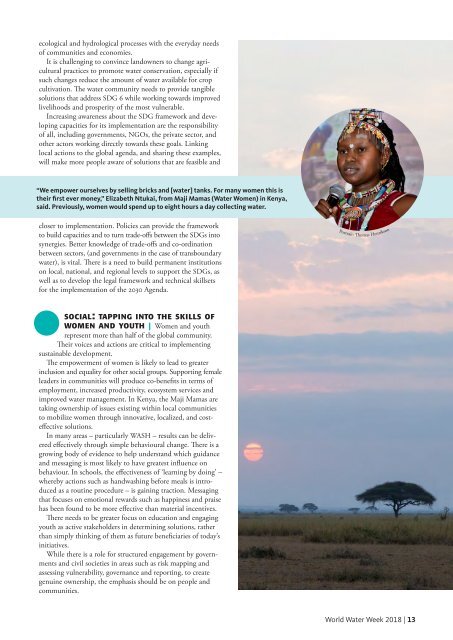World Water Week 2018: Overarching conclusions
Create successful ePaper yourself
Turn your PDF publications into a flip-book with our unique Google optimized e-Paper software.
ecological and hydrological processes with the everyday needs<br />
of communities and economies.<br />
It is challenging to convince landowners to change agricultural<br />
practices to promote water conservation, especially if<br />
such changes reduce the amount of water available for crop<br />
cultivation. The water community needs to provide tangible<br />
solutions that address SDG 6 while working towards improved<br />
livelihoods and prosperity of the most vulnerable.<br />
Increasing awareness about the SDG framework and developing<br />
capacities for its implementation are the responsibility<br />
of all, including governments, NGOs, the private sector, and<br />
other actors working directly towards these goals. Linking<br />
local actions to the global agenda, and sharing these examples,<br />
will make more people aware of solutions that are feasible and<br />
“We empower ourselves by selling bricks and [water] tanks. For many women this is<br />
their first ever money,” Elizabeth Ntukai, from Maji Mamas (<strong>Water</strong> Women) in Kenya,<br />
said. Previously, women would spend up to eight hours a day collecting water.<br />
closer to implementation. Policies can provide the framework<br />
to build capacities and to turn trade-offs between the SDGs into<br />
synergies. Better knowledge of trade-offs and co-ordination<br />
between sectors, (and governments in the case of transboundary<br />
water), is vital. There is a need to build permanent institutions<br />
on local, national, and regional levels to support the SDGs, as<br />
well as to develop the legal framework and technical skillsets<br />
for the implementation of the 2030 Agenda.<br />
Portrait: Thh<br />
omas Henrikson<br />
social: tapping into the skills of<br />
women and youth | Women and youth<br />
represent more than half of the global community.<br />
Their voices and actions are critical to implementing<br />
sustainable development.<br />
The empowerment of women is likely to lead to greater<br />
inclusion and equality for other social groups. Supporting female<br />
leaders in communities will produce co-benefits in terms of<br />
employment, increased productivity, ecosystem services and<br />
improved water management. In Kenya, the Maji Mamas are<br />
taking ownership of issues existing within local communities<br />
to mobilize women through innovative, localized, and costeffective<br />
solutions.<br />
In many areas – particularly WASH – results can be delivered<br />
effectively through simple behavioural change. There is a<br />
growing body of evidence to help understand which guidance<br />
and messaging is most likely to have greatest influence on<br />
behaviour. In schools, the effectiveness of ‘learning by doing’ –<br />
whereby actions such as handwashing before meals is introduced<br />
as a routine procedure – is gaining traction. Messaging<br />
that focuses on emotional rewards such as happiness and praise<br />
has been found to be more effective than material incentives.<br />
There needs to be greater focus on education and engaging<br />
youth as active stakeholders in determining solutions, rather<br />
than simply thinking of them as future beneficiaries of today’s<br />
initiatives.<br />
While there is a role for structured engagement by governments<br />
and civil societies in areas such as risk mapping and<br />
assessing vulnerability, governance and reporting, to create<br />
genuine ownership, the emphasis should be on people and<br />
communities.<br />
<strong>World</strong> <strong>Water</strong> <strong>Week</strong> <strong>2018</strong> | 13


















